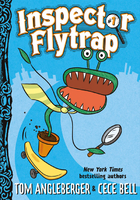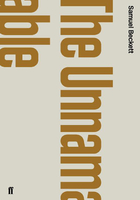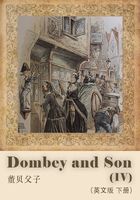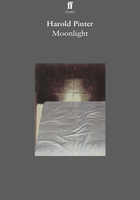He was working on the edge of the common, beyond the small brook that ran in the dip at the bottom of the garden, carrying the garden path in continuation from the plank bridge on to the common. He had cut the rough turf and bracken, leaving the grey, dryish soil bare. But he was worried because he could not get the path straight, there was a pleat between his brows. He had set up his sticks, and taken the sights between the big pine trees, but for some reason everything seemed wrong. He looked again, straining his keen blue eyes, that had a touch of the Viking in them, through the shadowy pine trees as through a doorway, at the green-grassed garden-path rising from the shadow of alders by the log bridge up to the sunlit flowers. Tall white and purple columbines, and the butt-end of the old Hampshire cottage that crouched near the earth amid flowers, blossoming in the bit of shaggy wildness round about.
There was a sound of children's voices calling and talking: high, childish, girlish voices, slightly didactic and tinged with domineering: 'If you don't come quick, nurse, I shall run out there to where there are snakes.' And nobody had the sangfroid to reply: 'Run then, little fool.' It was always, 'No, darling. Very well, darling. In a moment, darling. Darling, you must be patient.'
His heart was hard with disillusion: a continual gnawing and resistance.
But he worked on. What was there to do but submit!
The sunlight blazed down upon the earth, there was a vividness of flamy vegetation, of fierce seclusion amid the savage peace of the commons. Strange how the savage England lingers in patches: as here, amid these shaggy gorse commons, and marshy, snake infested places near the foot of the south downs. The spirit of place lingering on primeval, as when the Saxons came, so long ago.
Ah, how he had loved it! The green garden path, the tufts of flowers, purple and white columbines, and great oriental red poppies with their black chaps and mulleins tall and yellow, this flamy garden which had been a garden for a thousand years, scooped out in the little hollow among the snake-infested commons. He had made it flame with flowers, in a sun cup under its hedges and trees. So old, so old a place! And yet he had re-created it.
The timbered cottage with its sloping, cloak-like roof was old and forgotten. It belonged to the old England of hamlets and yeomen. Lost all alone on the edge of the common, at the end of a wide, grassy, briar-entangled lane shaded with oak, it had never known the world of today. Not till Egbert came with his bride. And he had come to fill it with flowers.
The house was ancient and very uncomfortable. But he did not want to alter it. Ah, marvellous to sit there in the wide, black, time-old chimney, at night when the wind roared overhead, and the wood which he had chopped himself sputtered on the hearth! Himself on one side the angle, and Winifred on the other.
Ah, how he had wanted her: Winifred! She was young and beautiful and strong with life, like a flame in sunshine. She moved with a slow grace of energy like a blossoming, red-flowered bush in motion. She, too, seemed to come out of the old England, ruddy, strong, with a certain crude, passionate quiescence and a hawthorn robustness. And he, he was tall and slim and agile, like an English archer with his long supple legs and fine movements. Her hair was nut-brown and all in energic curls and tendrils. Her eyes were nut-brown, too, like a robin's for brightness. And he was white-skinned with fine, silky hair that had darkened from fair, and a slightly arched nose of an old country family. They were a beautiful couple.
The house was Winifred's. Her father was a man of energy, too. He had come from the north poor. Now he was moderately rich. He had bought this fair stretch of inexpensive land, down in Hampshire. Not far from the tiny church of the almost extinct hamlet stood his own house, a commodious old farmhouse standing back from the road across a bare grassed yard. On one side of this quadrangle was the long, long barn or shed which he had made into a cottage for his youngest daughter Priscilla. One saw little blue-and-white check curtains at the long windows, and inside, overhead, the grand old timbers of the high-pitched shed. This was Prissy's house. Fifty yards away was the pretty little new cottage which he had built for his daughter Magdalen, with the vegetable garden stretching away to the oak copse. And then away beyond the lawns and rose trees of the house-garden went the track across a shaggy, wild grass space, towards the ridge of tall black pines that grew on a dyke-bank, through the pines and above the sloping little bog, under the wide, desolate oak trees, till there was Winifred's cottage crouching unexpectedly in front, so much alone, and so primitive.
It was Winifred's own house, and the gardens and the bit of common and the boggy slope were hers: her tiny domain. She had married just at the time when her father had bought the estate, about ten years before the war, so she had been able to come to Egbert with this for a marriage portion. And who was more delighted, he or she, it would be hard to say. She was only twenty at the time, and he was only twenty-one. He had about a hundred and fifty pounds a year of his own-and nothing else but his very considerable personal attractions. He had no profession: he earned nothing. But he talked of literature and music, he had a passion for old folk-music, collecting folk-songs and folk-dances, studying the Morris-dance and the old customs. Of course in time he would make money in these ways.
Meanwhile youth and health and passion and promise. Winifred's father was always generous: but still, he was a man from the north with a hard head and a hard skin too, having received a good many knocks. At home he kept the hard head out of sight, and played at poetry and romance with his literary wife and his sturdy, passionate girls. He was a man of courage, not given to complaining, bearing his burdens by himself. No, he did not let the world intrude far into his home. He had a delicate, sensitive wife whose poetry won some fame in the narrow world of letters. He himself, with his tough old barbarian fighting spirit, had an almost child-like delight in verse, in sweet poetry, and in the delightful game of a cultured home. His blood was strong even to coarseness. But that only made the home more vigorous, more robust and Christmassy. There was always a touch of Christmas about him, now he was well off. If there was poetry after dinner, there were also chocolates and nuts, and good little out-of-the-way things to be munching.
Well then, into this family came Egbert. He was made of quite a different paste. The girls and the father were strong-limbed, thick-blooded people, true English, as holly-trees and hawthorn are English. Their culture was grafted on to them, as one might perhaps graft a common pink rose on to a thornstem. It flowered oddly enough, but it did not alter their blood.
And Egbert was a born rose. The age-long breeding had left him with a delightful spontaneous passion. He was not clever, nor even 'literary'. No, but the intonation of his voice, and the movement of his supple, handsome body, and the fine texture of his flesh and his hair, the slight arch of his nose, the quickness of his blue eyes would easily take the place of poetry. Winifred loved him, loved him, this southerner, as a higher being. A higher being, mind you. Not a deeper. And as for him, he loved her in passion with every fibre of him. She was the very warm stuff of life to him.
Wonderful then, those days at Crockham Cottage, the first days, all alone save for the woman who came to work in the mornings. Marvellous days, when she had all his tall, supple, fine-fleshed youth to herself, for herself, and he had her like a ruddy fire into which he could cast himself for rejuvenation. Ah, that it might never end, this passion, this marriage! The flame of their two bodies burnt again into that old cottage, that was haunted already by so much by-gone, physical desire. You could not be in the dark room for an hour without the influences coming over you. The hot blood-desire of by-gone yeomen, there in this old den where they had lusted and bred for so many generations. The silent house, dark, with thick, timbered walls and the big black chimney-place, and the sense of secrecy. Dark, with low, little windows, sunk into the earth. Dark, like a lair where strong beasts had lurked and mated, lonely at night and lonely by day, left to themselves and their own intensity for so many generations. It seemed to cast a spell on the two young people. They became different. There was a curious secret glow about them, a certain slumbering flame hard to understand, that enveloped them both. They too felt that they did not belong to the London world any more. Crockham had changed their blood: the sense of the snakes that lived and slept even in their own garden, in the sun, so that he, going forward with the spade, would see a curious coiled brownish pile on the black soil, which suddenly would start up, hiss, and dazzle rapidly away, hissing. One day Winifred heard the strangest scream from the flower-bed under the low window of the living room: ah, the strangest scream, like the very soul of the dark past crying aloud. She ran out, and saw a long brown snake on the flower-bed, and in its flat mouth the one hind leg of a frog was striving to escape, and screaming its strange, tiny, bellowing scream. She looked at the snake, and from its sullen flat head it looked at her, obstinately. She gave a cry, and it released the frog and slid angrily away.
That was Crockham. The spear of modern invention had not passed through it, and it lay there secret, primitive, savage as when the Saxons first came. And Egbert and she were caught there, caught out of the world.
He was not idle, nor was she. There were plenty of things to be done, the house to be put into final repair after the workmen had gone, cushions and curtains to sew, the paths to make, the water to fetch and attend to, and then the slope of the deep-soiled, neglected garden to level, to terrace with little terraces and paths, and to fill with flowers. He worked away, in his shirt-sleeves, worked all day intermittently doing this thing and the other. And she, quiet and rich in herself, seeing him stooping and labouring away by himself, would come to help him, to be near him. He of course was an amateur-a born amateur. He worked so hard, and did so little, and nothing he ever did would hold together for long. If he terraced the garden, he held up the earth with a couple of long narrow planks that soon began to bend with the pressure from behind, and would not need many years to rot through and break and let the soil slither all down again in a heap towards the stream-bed. But there you are. He had not been brought up to come to grips with anything, and he thought it would do. Nay, he did not think there was anything else except little temporary contrivances possible, he who had such a passion for his old enduring cottage, and for the old enduring things of the bygone England. Curious that the sense of permanency in the past had such a hold over him, whilst in the present he was all amateurish and sketchy.
Winifred could not criticize him. Town-bred, everything seemed to her splendid, and the very digging and shovelling itself seemed romantic. But neither Egbert nor she yet realized the difference between work and romance.
Godfrey Marshall, her father, was at first perfectly pleased with the ménage down at Crockham Cottage. He thought Egbert was wonderful, the many things he accomplished, and he was gratified by the glow of physical passion between the two young people. To the man who in London still worked hard to keep steady his modest fortune, the thought of this young couple digging away and loving one another down at Crockham Cottage, buried deep among the commons and marshes, near the pale-showing bulk of the downs, was like a chapter of living romance. And they drew the sustenance for their fire of passion from him, from the old man. It was he who fed their flame. He triumphed secretly in the thought. And it was to her father that Winifred still turned, as the one source of all surety and life and support. She loved Egbert with passion. But behind her was the power of her father. It was the power of her father she referred to, whenever she needed to refer. It never occurred to her to refer to Egbert, if she were in difficulty or doubt. No, in all the serious matters she depended on her father.
For Egbert had no intention of coming to grips with life. He had no ambition whatsoever. He came from a decent family, from a pleasant country home, from delightful surroundings. He should, of course, have had a profession. He should have studied law or entered business in some way. But no-that fatal three pounds a week would keep him from starving as long as he lived, and he did not want to give himself into bondage. It was not that he was idle. He was always doing something, in his amateurish way. But he had no desire to give himself to the world, and still less had he any desire to fight his way in the world. No, no, the world wasn't worth it. He wanted to ignore it, to go his own way apart, like a casual pilgrim down the forsaken sidetracks. He loved his wife, his cottage and garden. He would make his life there, as a sort of epicurean hermit. He loved the past, the old music and dances and customs of old England. He would try and live in the spirit of these, not in the spirit of the world of business.
But often Winifred's father called her to London: for he loved to have his children round him. So Egbert and she must have a tiny flat in town, and the young couple must transfer themselves from time to time from the country to the city. In town Egbert had plenty of friends, of the same ineffectual sort as himself, tampering with the arts, literature, painting, sculpture, music. He was not bored.
Three pounds a week, however, would not pay for all this. Winifred's father paid. He liked paying. He made her only a very small allowance, but he often gave her ten pounds-or gave Egbert ten pounds. So they both looked on the old man as the mainstay. Egbert didn't mind being patronized and paid for. Only when he felt the family was a little too condescending, on account of money, he began to get huffy.
Then of course children came: a lovely little blonde daughter with a head of thistle-down. Everybody adored the child. It was the first exquisite blonde thing that had come into the family, a little mite with the white, slim, beautiful limbs of its father, and as it grew up the dancing, dainty movement of a wild little daisy-spirit. No wonder the Marshalls all loved the child: they called her Joyce. They themselves had their own grace, but it was slow, rather heavy. They had everyone of them strong, heavy limbs and darkish skins, and they were short in stature. And now they had for one of their own this light little cowslip child. She was like a little poem in herself.
But nevertheless, she brought a new difficulty. Winifred must have a nurse for her. Yes, yes, there must be a nurse. It was the family decree. Who was to pay for the nurse? The grandfather-seeing the father himself earned no money. Yes, the grandfather would pay, as he had paid all the lying-in expenses. There came a slight sense of money-strain. Egbert was living on his father-in-law.
After the child was born, it was never quite the same between him and Winifred. The difference was at first hardly perceptible. But it was there. In the first place Winifred had a new centre of interest. She was not going to adore her child. But she had what the modern mother so often has in the place of spontaneous love: a profound sense of duty towards her child. Winifred appreciated her darling little girl, and felt a deep sense of duty towards her. Strange, that this sense of duty should go deeper than the love for her husband. But so it was. And so it often is. The responsibility of motherhood was the prime responsibility in Winifred's heart: the responsibility of wifehood came a long way second.
Her child seemed to link her up again in a circuit with her own family. Her father and mother, herself, and her child, that was the human trinity for her. Her husband-? Yes, she loved him still. But that was like play. She had an almost barbaric sense of duty and of family. Till she married, her first human duty had been towards her father: he was the pillar, the source of life, the everlasting support. Now another link was added to the chain of duty: her father, herself, and her child.
Egbert was out of it. Without anything happening, he was gradually, unconsciously excluded from the circle. His wife still loved him, physically. But, but-he was almost the unnecessary party in the affair. He could not complain of Winifred. She still did her duty towards him. She still had a physical passion for him, that physical passion on which he had put all his life and soul. But-but-
It was for a long while an ever-recurring but. And then, after the second child, another blonde, winsome touching little thing, not so proud and flame-like as Joyce-after Annabel came, then Egbert began truly to realize how it was. His wife still loved him. But-and now the but had grown enormous-her physical love for him was of secondary importance to her. It became ever less important. After all, she had had it, this physical passion, for two years now. It was not this that one lived from. No, no-something sterner, realer.
She began to resent her own passion for Egbert-just a little she began to despise it. For after all there he was, he was charming, he was lovable, he was terribly desirable. But-but-oh, the awful looming cloud of that but!-he did not stand firm in the landscape of her life like a tower of strength, like a great pillar of significance. No, he was like a cat one has about the house, which will one day disappear and leave no trace. He was like a flower in the garden, trembling in the wind of life, and then gone, leaving nothing to show. As an adjunct, as an accessory, he was perfect. Many a woman would have adored to have him about her all her life, the most beautiful and desirable of all her possessions. But Winifred belonged to another school.
The years went by, and instead of coming more to grips with life, he relaxed more. He was of a subtle, sensitive, passionate nature. But he simply would not give himself to what Winifred called life, Work. No, he would not go into the world and work for money. No, he just would not. If Winifred liked to live beyond their small income-well, it was her look-out.
And Winifred did not really want him to go out into the world to work for money. Money became, alas, a word like a firebrand between them, setting them both aflame with anger. But that is because we must talk in symbols. Winifred did not really care about money. She did not care whether he earned or did not earn anything. Only she knew she was dependent on her father for three-fourths of the money spent for herself and her children, that she let that be the casus belli, the drawn weapon between herself and Egbert.
What did she want-what did she want? Her mother once said to her, with that characteristic touch of irony: 'Well, dear, if it is your fate to consider the lilies, that toil not, neither do they spin, that is one destiny among many others, and perhaps not so unpleasant as most. Why do you take it amiss, my child?'
The mother was subtler than her children, they very rarely knew how to answer her. So Winifred was only more confused. It was not a question of lilies. At least, if it were a question of lilies, then her children were the little blossoms. They at least grew. Doesn't Jesus say: 'Consider the lilies how they grow.' Good then, she had her growing babies. But as for that other tall, handsome flower of a father of theirs, he was full grown already, so she did not want to spend her life considering him in the flower of his days.
No, it was not that he didn't earn money. It was not that he was idle. He was not idle. He was always doing something, always working away, down at Crockham, doing little jobs. But, oh dear, the little jobs-the garden paths-the gorgeous flowers-the chairs to mend, old chairs to mend!
It was that he stood for nothing. If he had done something unsuccessfully, and lost what money they had! If he had but striven with something. Nay, even if he had been wicked, a waster, she would have been more free. She would have had something to resist, at least. A waster stands for something, really. He says: 'No, I will not aid and abet society in this business of increase and hanging together, I will upset the apple-cart as much as I can, in my small way.' Or else he says: 'No, I will not bother about others. If I have lusts, they are my own, and I prefer them to other people's virtues.' So, a waster, a scamp, takes a sort of stand. He exposes himself to opposition and final castigation: at any rate in story-books.
But Egbert! What are you to do with a man like Egbert? He had no vices. He was really kind, nay generous. And he was not weak. If he had been weak Winifred could have been kind to him. But he did not even give her that consolation. He was not weak, and he did not want her consolation or her kindness. No, thank you. He was of a fine passionate temper, and of a rarer steel than she. He knew it, and she knew it. Hence she was only the more baffled and maddened, poor thing. He, the higher, the finer, in his way the stronger, played with his garden, and his old folk-songs and Morris-dances, just played, and let her support the pillars of the future on her own heart.















